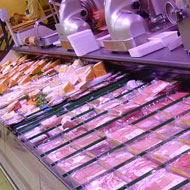MRSA found in British pork

The discovery has sparked fears MRSA could turn into a major problem.
British produced pork contaminated with MRSA has been found on the shelves of major supermarkets ASDA and Sainsbury’s, according to the Bureau of Investigative Journalism.
Tests on three packets of supermarket meat found a livestock variant of MRSA (LA-MRSA CC398) that is resistant to some antibiotics including medicines that are critical in human healthcare.
But while the discovery has sparked fears MRSA could turn into a major problem, food safety experts have downplayed the scare.
Speaking to Farmers Weekly, Nicola Williams, a professor of bacterial zoonotic disease at the University of Liverpool, said: “Current data does not suggest that LA-MRSA is common among UK pig herds.
“Even if herds are infected with significant levels of the bacteria, the extent of contamination of meat with MRSA will be much lower than compared to food-poisoning bacteria such as salmonella, so the risk of transmission to people will be lower.
“Adopting good hygiene practices in the kitchen, washing your hands when handling raw meat and cooking meat properly should minimise any risk.”
Mark Woolhouse, a professor of infectious disease epidemiology at the University of Edinburgh, added that LA-MRSA is a well-known, but rare, food safety risk.
“It has been found in food animals, in food and occasionally in people for many years,” he said. “It must be taken seriously but it has shown no sign of causing a pandemic and this small study does not change that assessment.”
According to the Bureau, LA-MRSA CC398 can be passed to humans when they work directly with livestock, but also when they handle contaminated meat.
The disease is resistant to human medicine. While many people can carry the bacteria without getting ill, the strain can cause skin complaints in addition to more serious, life-threatening infections.



 The latest
The latest